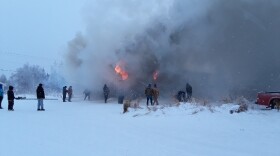It’s been a week since a fire destroyed Tununak’s washeteria. The fire has left the community without a place to wash clothes. Last year, in a similar incident, a fire destroyed a washeteria in a different Y-K Delta community. The governor issued a disaster declaration to each village, but the timeline was very different.
The Tununak fire started on Feb. 15 when workers were replacing a meter box at the washeteria. There is no running water in the community of about 400 people. Tununak Tribal Administrator Xavier Post said that the fire grew too big before volunteers could fill up water tanks to put it out.
Two days later, Gov. Mike Dunleavy signed a disaster declaration. It frees up to $1 million in state funding to cover response efforts. A spokesperson for the Alaska Department of Homeland Security and Emergency Management, Jeremy Zidek, said that those funds can only be used to bring structures back to what they were before the disaster.
“We're still evaluating options on how we're going to restore the washeteria in Tununak. And we're still early on in the process,” said Zidek.
A similar incident happened last year in another Y-K Delta community. Just over a year ago, a fire destroyed the washeteria in Tuluksak. The community also does not have running water. But in Tuluksak, the stakes were a lot higher. The washeteria fire destroyed the community’s only source of drinking water.
That was not the case in Tununak, where the city has another watering point. The CEO of the Yukon-Kuskokwim Health Corporation, Dan Winkelman, said that it’s not as urgent a situation in Tununak as it was in Tuluksak.
“In Tuluksak, we had a catastrophic situation where there was no potable water source in the village. [In Tununak], we have a potable water source that we're planning on continuing to use,” said Winkelman.
The state government’s response was different for each community. In Tuluksak, where there was no potable water, the governor issued a disaster declaration about three-and-a-half weeks after the fire. No government entity sent drinking water to the community during the days immediately following. This inaction was met with widespread criticism.
But in Tununak, Dunleavy issued a disaster declaration two days after the fire. When KYUK posted a story about the quick disaster declaration in Tununak, commenters drew comparisons between the two fires and the differing responses.
Former Bethel resident Crissy Elliott praised the government’s quick disaster declaration for Tununak in a Facebook comment. She said that the government “had previously failed, then acknowledged and learned.”
The governor’s office didn’t see it that way. Dunleavy Administration spokesperson Jeff Turner wrote in an email to KYUK that “The State responded to both Tuluksak and Tununak immediately. A disaster declaration is a long-term recovery tool and has no impact on the administration's response.”
Brian Lefferts, the Director of the Office of Environmental Health and Engineering at the YKHC, said that he’ll be sending workers out to Tununak this week to assess the situation and try to get a temporary replacement facility there as soon as possible. They don’t have funding secured yet, but they’re working with Indian Health Service to get it. He also said the community already had long-term plans and funding in place to build a replacement laundry facility and a water treatment plant.
Lefferts said that the consequences for a community living without laundry facilities would be significant.
“We see, especially in places that don't have any water, higher levels of water washed illnesses. And some of those include skin infection, which may be linked to the ability to do laundry,” said Lefferts.
Meanwhile, in Tununak, resident Caroline Usugan said that she’s not sure how her community will wash clothes now. There is no running water to any homes in the village.
“Basically we're living in the old time. So we really depended on that laundromat for clean clothes,” said Usugan.
A report from the Alaska Native Tribal Health Consortium shows that 13 communities in the Y-K Delta don’t have running water. Those include Tununak and Tuluksak.
Tununak's tribal administrator said that with running water, the fire could have been easily stopped before it consumed the whole washeteria.
An earlier version of this story said Usugan was not sure how she would do laundry. That's incorrect. Usugan was concerned for community members who don't have laundry machines at home.






